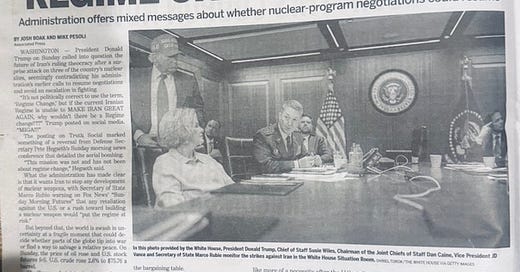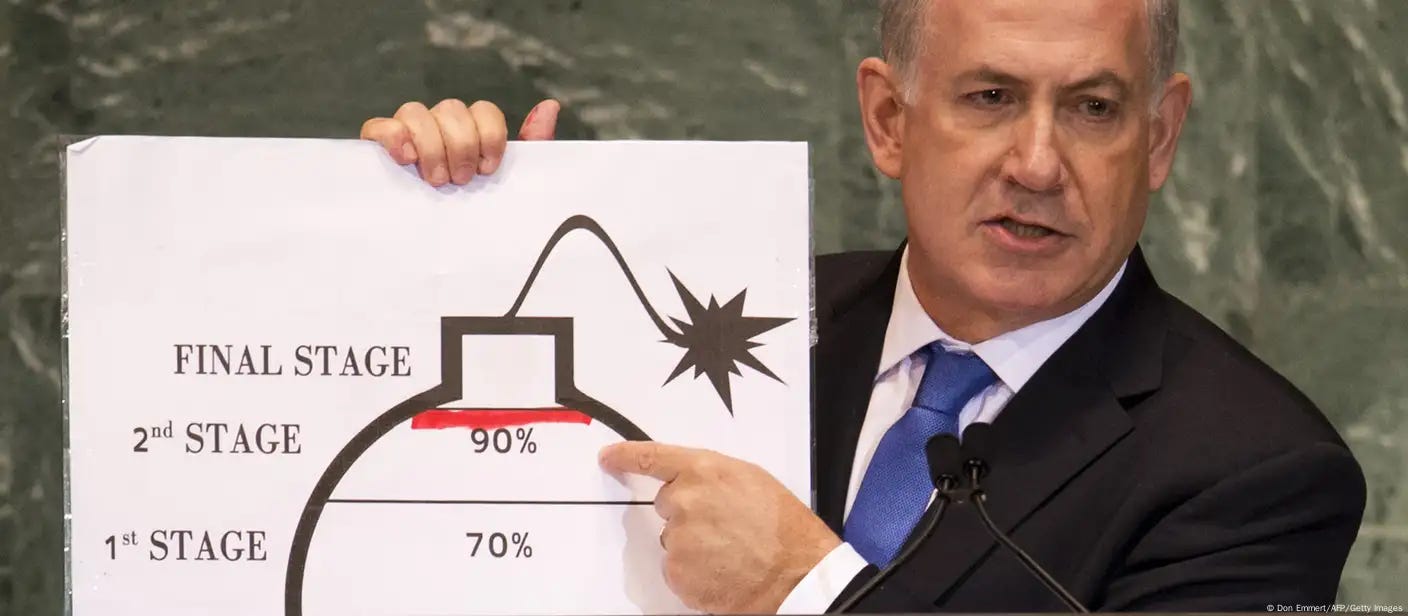We're at war again.
In the hours after U.S. and Israeli warplanes hit Iranian cities with bunker-busters, the death toll told a different story than “surgical precision.”
“We’re not at war with Iran. We’re at war with Iran’s nuclear program.” — J.D. Vance
“This is not deterrence. This is collective punishment. Hundreds of civilians are dead, and we’re being told to celebrate it as a strategic success?” — Rep. Alexandria Ocasio-Cortez
Despite Vance’s claim, the U.S. is now at war with Iran, a country of more than 90 million people and one with political and military alliances across the Middle East, and deepening strategic partnerships with Russia and China.
Iran’s parliament has voted to shut down the vital Hormuz shipping channel in retaliation against Trump’s attack on the country, prompting fears of a sharp spike in oil prices that could cause a global recession. A fifth of the world’s oil consumption flows through the Strait of Hormuz, which is a gateway out of the Persian Gulf. (Guardian)
Who the hell (besides Netanyahu) thought that was a great strategic move? I’m taking names.
* * *
Under international law, if a country uses force without a clear legal justification—such as self-defense or UN Security Council approval—and that force results in large-scale civilian deaths, it can be classified as an act of aggression or even a war crime. The U.S. has not provided evidence of an imminent threat, and the scale of destruction suggests this was not a narrowly tailored strike.
The repeated claims made by Israel over the past two decades, and now by Trump, that Iran was close (15 days away) from building a nuclear bomb have become laughable fodder for late-night talk show comedians like John Stewart.
War crimes mount up
In the hours after U.S. and Israeli warplanes hit Iranian cities with bunker-busters, the death toll told a different story than “surgical precision.”
The Center for Human Rights in Iran calls it what it is: a massacre veiled as deterrence. Their dispatch describes “deliberate targeting of civilians” and the erasure of critical infrastructure.
From Geneva, UN Human Rights Chief Volker Türk warns that the strikes have pushed the region to the edge of the abyss. “Appalling collateral damage,” he said—diplomatic speak for charred apartment blocks, bloodied markets, and children caught under slabs of concrete.
The Human Rights Activists News Agency (HRANA) reports that 865 people have been killed in Iran since the start of the U.S. and Israeli bombing campaign—including 363 civilians, 215 military personnel, and 287 unidentified victims. They also report 3,396 injuries, with many of the wounded suffering life-altering trauma.
HRANA has verified the identities of more than 20 children killed, most of them in Tehran. The strikes have hit 21 of Iran’s 31 provinces, including densely populated areas, and documented attacks on residential neighborhoods, hospitals, and aid convoys.
A question now being asked in both diplomatic circles and defense briefings: did the U.S. strikes actually cripple Iran’s nuclear program—or just crater the desert?
The Pentagon claims “extremely severe damage and destruction” at all three targeted sites—Fordow, Natanz, and Isfahan—with Defense Secretary Pete Hegseth declaring Iran’s nuclear ambitions “obliterated.”
But Iran is telling a very different story. Officials say the damage was “superficial” and that key nuclear materials had already been moved before the strikes. Hassan Abedini, deputy political director of Iran’s state broadcaster, claimed on air that the facilities “didn’t suffer a major blow”.
Even the International Atomic Energy Agency (IAEA) is hedging. They confirmed strikes occurred and noted damage to electrical infrastructure at Natanz, but said it’s too early to assess the full impact—and crucially, no radiation leaks have been detected.
Some Democrats are fighting to stop war with Iran, but party leaders are silently acquiescing or, worse, supporting an attack.
Democrats are once again in a bind. It’s difficult for those who have been supportive of Israel’s genocidal war on Gaza and the bombings of Lebanon and Syria to now criticize Trump’s raid on Iran. Several Democratic leaders have been calling for war on Iran and for regime change for decades.
Now, they are focusing their objections on the process, arguing that Trump launched the strikes without congressional authorization and they are pushing a dead-end resolution to block further military action without a vote. House Minority Leader Hakeem Jeffries and Senate Minority Leader Chuck Schumer both stopped short of condemning the strikes themselves.
Just weeks before the U.S. bombing campaign, Schumer issued a statement reaffirming that “Iran cannot have a nuclear weapon” and that the U.S. commitment to Israel’s security must be “ironclad.”
By centering the debate on procedure rather than principle, Democrats risk appearing complicit in the broader logic of militarized foreign policy, and that’s precisely what contributed to their loss in ‘24.
NYC mayoral candidate Zohan Mamdani pulls no punches when it comes to Trump’s bombing of Iran.
In a statement issued shortly after the attacks, Mamdani declared:
“Today’s unconstitutional military action represents a dark, new chapter in [Trump’s] endless betrayals that now threaten to plunge the world deeper into chaos.”
He also connected the bombings to broader systemic failures, saying the political establishment would rather fund “endless wars” than invest in the well-being of Americans. Mamdani emphasized that in a global city like New York, the consequences of war are not distant—they’re felt at home.
His stance has drawn sharp contrasts with rival Andrew Cuomo, who supported the goal of neutralizing Iran’s nuclear capacity while criticizing Trump for bypassing Congress. Mamdani, by contrast, rejected both the means and the ends, framing the attack as part of a long pattern of militarism and elite impunity.
AOC has also been sharply critical of her own party’s leadership for what she called “moral cowardice,” saying that “procedural objections mean nothing if we won’t speak out against mass death.”
Senator Bernie Sanders has been one of the most precise and most forceful critics of the U.S. bombing campaign in Iran, calling it a “war based on lies” and drawing direct parallels to the deceptions that led to Vietnam and Iraq. Both of those wars, by the way, were waged without a congressional declaration of war, even though they were among the most consequential and long-lasting military engagements in U.S. history.
Critics on the right, like Steve Bannon, say that the strikes may have been more symbolic than strategic, calling the operation “incrementalism” and questioning whether it achieved anything beyond escalation. They and neocon Democrats want nothing short of regime change.
This was never about Iran’s nukes. Trump is threatening not just Iran, but the entire Middle East as well as competing powers in Asia and Europe —that the U.S. is still willing to use overwhelming force to shape outcomes, even without international consensus. While the official line is about stopping a bomb, the broader picture suggests a mix of political theater and power projection, pure imperialist hegemonism, and a play to his own divided MAGA political base.








Very good. I’ll pass it around.